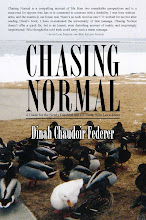For those of you who’ve read my book Chasing Normal, you know that I encourage people to polish their self advocacy skills. As adults with disabilities, we don’t need to tolerate poor or disrespectful treatment by service providers. We have the right to say “This is unacceptable.”
I have no problem with self advocacy. In fact, I have a bit of a barracuda that dwells inside me. I work hard to keep that side of my personality on a VERY short leash. When it surfaces, it’s generally not attractive. However, I do use it when necessary.
Recently, I decided it was time to call the barracuda into action. My insurance plan allows me 50 sessions of physical (PT) and occupational (OT) therapy per calendar year. My doctor ordered PT and OT to help me regain my strength following some health challenges. My insurance carrier contracts these decisions to another company with PT’s and OT’s on staff. The decision was returned as granting me 4 visits. After another request I was granted 3 more but they stated that they view me as having a chronic condition and that I’m unable to benefit. –Oh really??
Someone who never met me and only barely read the reports is saying I’m hopeless? Then why do I pay for insurance? I found this to be insulting and abusive, not to mention discriminatory! Last year my nondisabled, very physically fit husband was in PT for at least 3 months to deal with an injury. Yet I, a disabled adult, am not afforded even half that time before being deemed “unable to benefit!”
This is precisely the kind of treatment we need to reject loudly and clearly. It is unacceptable to judge a person with a disability by the same standards used to measure the nondisabled. Whether through overt or covert means, discrimination in all its forms, is ugly and unacceptable. My personal decision was to write a very blunt letter detailing my intended actions if they chose to persist along this discriminatory path which would include: filing grievances with the insurance commissioner, my former employer’s insurance ombudsman, as well as pursuing a discrimination lawsuit to include damages for time and strength lost because of their actions.
Following my letter I was granted 2 sessions per week for 5 weeks. It’s not great, but it’s something. It’s progress. And, it’s progress directly related to my refusal to accept the unacceptable. It is said that, for everything, there is a season. There is a season or a reason to fight back when you’re on the receiving end of injustice. It’s time consuming and exhausting and there are far more preferable ways to utilize limited energy. But receiving fair and equitable treatment is the right of every individual. And saying “ENOUGH” and not backing down is, sometimes, the only means to that desired end.
May you know your own strength if/when you need to say “ENOUGH!”
Light and blessings,
dinah
Dinah Chaudoir Federer is the Author of Chasing Normal: A Guide for the Newly Disabled and for Those who Love Them which can be purchased at Chasing-Normal.com or Amazon.com
